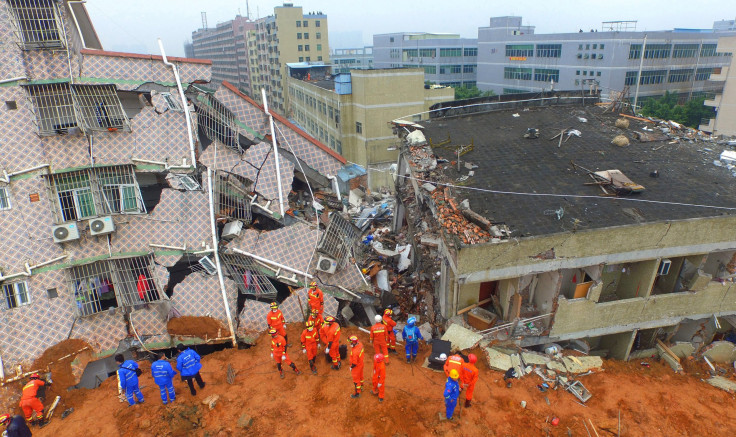China Landslide Update: Waste Dump In Shenzhen Was Ordered Closed But Stayed Open, Dozens Still Missing

The waste dump that led to a disastrous landslide Sunday in the Chinese industrial city of Shenzhen was ordered closed five months ago but continued to operate illegally, the South China Morning Post of Hong Kong reported Monday. The landslide, which destroyed at least 33 buildings and left at least 91 people missing, came after a series of ignored warnings and poor construction practices.
The accident was caused by the collapse of a mountain of dirt and construction debris at the site of a former quarry, China's state-run Xinhua News Agency reported. The landslide took place in the city’s Guangming New District, an industrial and residential section set up in 2007.
Residents told Xinhua the Hongao Construction Waste Dump had built up for nearly two years and stood at nearly 20 stories high when it collapsed. It also had overly steep slopes, making it unstable, the Ministry of Land and Natural Resources said.
Documents published on the Guangming New District website showed officials had conducted monthly inspections of the dump, the South China Morning Post reported. In February 2014, officials gave the dump approval to operate for just 12 more months, but found in July — five months after it should have closed — that it was still in operation. At that time, the site was not following agreed safety or maintenance plans.
Officials told the dump managers to improve its conditions and reapply for a license by September, which it also failed to do, according to the documents. “Illegal dumping of earth is strictly forbidden,” a statement in the documents said, according to the South China Morning Post.
China has had problems with unregulated dumping of construction waste for some time, the New York Times reported. New structures often don’t last very long, and lead to tall piles of debris that can cause dust and flooding if they block waterways.
Shenzhen, which is near Hong Kong, was one of China’s first special economic zones, and saw free-market measures introduced in the 1980s. Since then, industries such as biotechnology have moved to the area, but Sunday’s disaster demonstrated that Shenzhen still suffers from unregulated development like many other parts of the country.
Residents near the area of the landslide told Chinese media they had regularly complained about the dump and told authorities it looked unstable. Authorities did not stop the dump from operating in October, the South China Morning Post reported, despite saying at the time that they were cracking down on illegal dumping.
A company based in Shenzhen had also warned of dangers with the site, the New York Times reported. The company, Zongxing Environmental Technology, published an environmental impact assessment in January that warned that soil erosion could lead to landslides, “threatening the safety of hills and slopes,” the 21st Century Business Herald reported, according to the Times. The report and the notice on the Guangming New District website appeared to have been deleted Monday.
© Copyright IBTimes 2025. All rights reserved.






















